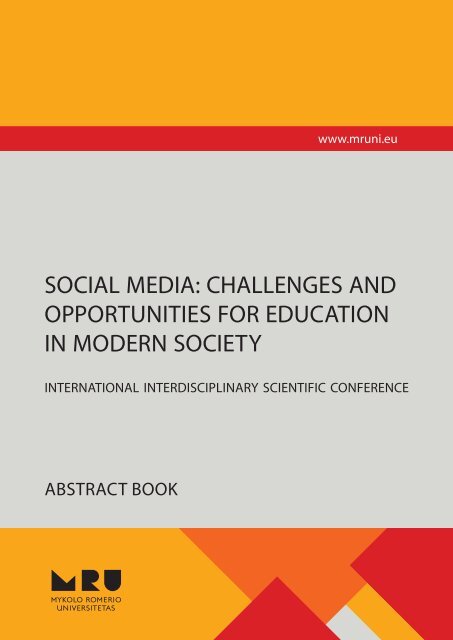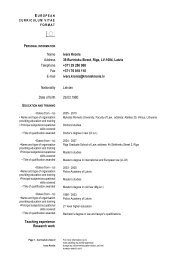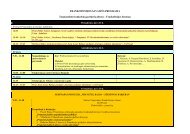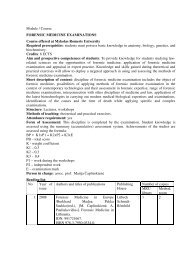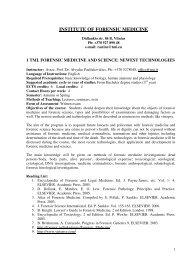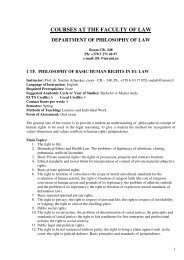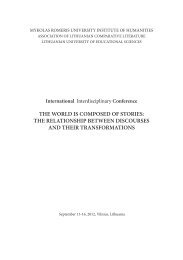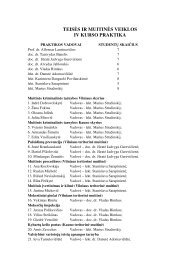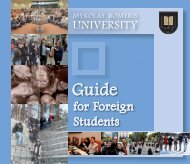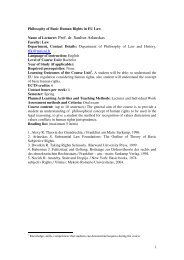SOCIAL MEDIA: CHALLENGES AND OPPORTUNITIES FOR ...
SOCIAL MEDIA: CHALLENGES AND OPPORTUNITIES FOR ...
SOCIAL MEDIA: CHALLENGES AND OPPORTUNITIES FOR ...
You also want an ePaper? Increase the reach of your titles
YUMPU automatically turns print PDFs into web optimized ePapers that Google loves.
www.mruni.eu<br />
<strong>SOCIAL</strong> <strong>MEDIA</strong>: <strong>CHALLENGES</strong> <strong>AND</strong><br />
<strong>OPPORTUNITIES</strong> <strong>FOR</strong> EDUCATION<br />
IN MODERN SOCIETY<br />
INTERNATIONAL INTERDISCIPLINARY SCIENTIFIC CONFERENCE<br />
ABSTRACT BOOK
<strong>SOCIAL</strong> <strong>MEDIA</strong>: <strong>CHALLENGES</strong> <strong>AND</strong><br />
<strong>OPPORTUNITIES</strong> <strong>FOR</strong> EDUCATION<br />
IN MODERN SOCIETY<br />
International interdisciplinary scientific conference<br />
ABSTRACT BOOK<br />
May 3, 2012
International interdisciplinary scientific conference /<br />
Conference Scientific Committee:<br />
Assoc. Prof. Dr. Vilhelmina Vaičiūnienė, Mykolas Romeris University, Institute of the Humanities<br />
Department of Foreign Languages, vvaiciun@mruni.eu<br />
Prof. Dr. Jolita Šliogerienė, Mykolas Romeris University, Institute of the Humanities<br />
Department of Foreign Languages, j.sliogeriene@mruni.eu<br />
Assoc. Prof. Dr. Galina Kavaliauskienė, Mykolas Romeris University, Institute of the Humanities<br />
Department of Foreign Languages, gkaval@mruni.eu<br />
Assoc. Prof. Dr. Jelena Suchanova, Mykolas Romeris University, Institute of the Humanities<br />
Department of Foreign Languages, jelena.s@mruni.eu<br />
Julia Fotheringham, Lecturer - Academic Practice<br />
The Office of the Vice Principal (Academic)<br />
Edinburgh Napier University, j.fotheringham@napie r.ac.uk<br />
Assoc. Prof. Dr. Dangis Gudelis, Mykolas Romeris University, Faculty of Politics and Management, Department<br />
of Public Administration, dgudel@mruni.eu<br />
Assoc. Prof. Dr. Agota Giedrė Raišienė, Mykolas Romeris University, Faculty of Politics and Management,<br />
Department of Management, agotar@mruni.eu<br />
Conference Organising Committee:<br />
Giedrė Valūnaitė Oleškevičienė, Mykolas Romeris University, Institute of the Humanities<br />
Department of Foreign Languages, gvalunaite@mruni.eu<br />
Assoc. Prof. Dr. Vilhelmina Vaičiūnienė, Mykolas Romeris University, Institute of the Humanities<br />
Department of Foreign Languages, vvaiciun@mruni.eu<br />
Nomeda Gudelienė, Mykolas Romeris University, Research Centre, Faculty of Politics and Management,<br />
Department of Management, ngudel@mruni.eu<br />
2
International interdisciplinary scientific conference /<br />
CONTENT<br />
Title, author Page<br />
Media Literacy and Uncertain Knowledge: The Case of Social Media in Education<br />
Prof. Dr. Michael Klebl, Chair of the Department of Vocational Education,<br />
Focus on Further Training and Educational Management,<br />
WHL Graduate School of Business and Economics<br />
The Pedagogy and Practice of Student Generated Content in Blended and Online Learning<br />
Julia Fotheringham, Lecturer - Academic Practice<br />
The Office of the Vice Principal (Academic)<br />
Edinburgh Napier University<br />
Learning Opportunities Using Mobile Devices<br />
Prof. Dr. Lorenzo Sommaruga, Nadia Catenazzi<br />
University of Applied Sciences and Arts of Italian Switzerland (SUPSI)<br />
Department of Innovative Technologies (DTI)<br />
ISIN - Institute of Information Systems and Networking<br />
Terrorism in the Wake of the 21st Century: Social Media as Educational Vehicle for Aspiring Terrorists<br />
Eugen Schlosser, Diplom Kaufmann (University)<br />
Research Associate<br />
Department of Managerial Accounting and Control<br />
WHL Graduate School of Business and Economics<br />
Presenting the ISTUS (Institutional Strategies Targeting the Uptake of Social Networking in Adult Education) Project<br />
Kirsty Palfreyman<br />
ICS<br />
Social Technologies and Distributed Leadership<br />
Prof. Dr. Aelita Skaržauskienė<br />
Mykolas Romeris University,<br />
Faculty of Social Informatics, Department of Electronic Business<br />
Legal Education System in Lithuania: Nowadays and New Challenges<br />
Prof. Dr. Eglė Bilevičiūtė<br />
Mykolas Romeris University, Faculty of Law,<br />
Department of Administrative Law and Procedure<br />
Dissemination of Information in Social Media: Legal Regulation, First<br />
Cases in Lithuania and Possible Solutions<br />
Liutaras Ulevičius<br />
Mykolas Romeris University, Faculty of Social Informatics,<br />
Department of Electronic Business<br />
Mokesčių mokėtojų švietimo ir konsultavimo problemos ir sprendimai<br />
Danutė Adomavičiūtė, Agna Balcevič<br />
Mykolas Romeris University, Faculty of Economics and Finance Management,<br />
Department of International Trade and Customs<br />
The Application of Crowdsourcing in Educational Activities<br />
Monika Skaržauskaitė<br />
Mykolas Romeris University, Faculty of Politics and Management,<br />
Department of Management<br />
Teachers and students collaboration through the e-medium: positive and negative aspects of electronic communication<br />
Assoc. Prof. Dr. Agota Giedrė Raišienė<br />
Mykolas Romeris University, Faculty of Politics and Management,<br />
Department of Management<br />
5<br />
5<br />
6<br />
6<br />
7<br />
7<br />
8<br />
9<br />
9<br />
10<br />
10<br />
3
International interdisciplinary scientific conference /<br />
Patyriminis užsienio kalbos mokymasis socialinėje medijoje: livemocha.com<br />
atvejo analizė<br />
Miglė Eleonora Černikovaitė<br />
Mykolas Romeris University, Faculty of Economics and Finance Management,<br />
Department of Business Economics<br />
ICT application and study techniques in Erasmus Exchange programmes- students’ mobility schemes<br />
Assoc. Prof. Dr. Vilhelmina Vaičiūnienė, Daiva Užpalienė<br />
Mykolas Romeris University, Institute of the Humanities,<br />
Department of Foreign Languages<br />
Socialiniai mokomieji tinklai suaugusiųjų užsienio dalykinės kalbos mokyme(si)<br />
Dalia Žuvininkaitė<br />
Mykolas Romeris University, Institute of the Humanities,<br />
Department of Foreign Languages<br />
Certain Aspects of Distance Learning Tools’ Application in Extramural ESP<br />
Studies and Students’ Motivation<br />
Liudmila Pogožilskaja, Helma Jankauskaitė, Olga Ušinskiene<br />
Mykolas Romeris University, Institute of the Humanities,<br />
Department of Foreign Languages<br />
International School of Law and Business<br />
Attitudes to Feedback and Correction: English for Students of Psychology and Law<br />
Assoc. Prof. Dr. Galina Kavaliauskienė, Assoc. Prof. Dr. Lilija Anusienė<br />
Mykolas Romeris University, Institute of the Humanities,<br />
Department of Foreign Languages<br />
Learner Approach to Online Activities in a Language Classroom<br />
Assoc. Prof. Dr. Galina Kavaliauskienė, Darius Valūnas<br />
Mykolas Romeris University, Institute of the Humanities,<br />
Department of Foreign Languages<br />
Use of web 2.0 technologies in teaching foreign language<br />
Aleksandra Paciuk<br />
Mykolas Romeris University, Institute of the Humanities,<br />
Department of Foreign Languages<br />
Social Media as a Tool for Ongoing Personal and Professional Development of Teachers<br />
Živilė Puodžiukaitienė<br />
Mykolas Romeris University, Institute of the Humanities,<br />
Department of Foreign Languages<br />
University Mission and Changing Organisational Culture: A Dilemma for Leadership<br />
Nomeda Gudelienė<br />
Mykolas Romeris University, Research Centre, Faculty of Politics and Management,<br />
Department of Management<br />
Social Media in the Process of University Studies<br />
Giedrė Valūnaitė –Oleškevičienė<br />
Mykolas Romeris University, Institute of the Humanities,<br />
Department of Foreign Languages<br />
11<br />
12<br />
12<br />
13<br />
13<br />
14<br />
14<br />
15<br />
16<br />
16<br />
4
International interdisciplinary scientific conference /<br />
<strong>MEDIA</strong> LITERACY <strong>AND</strong> UNCERTAIN KNOWLEDGE:<br />
THE CASE OF <strong>SOCIAL</strong> <strong>MEDIA</strong> IN EDUCATION<br />
Prof. Dr. Michael Klebl<br />
Chair, Department of Vocational Education,<br />
Focus on Further Training and Educational Management<br />
WHL Graduate School of Business and Economics<br />
Hohbergweg 15–17, 77933 Lahr, Germany<br />
Tel +49 7821 9238-35, Michael.klebl@whl-lahr.de<br />
http://www.whl-lahr.de<br />
Tools and applications of the Web 2.0 appear to provide socially embedded access to knowledge, and therefore,<br />
they become more and more important in education. However, the Web 2.0 offers technologies to create and<br />
disseminate knowledge, which also increase uncertainty. This presentation investigates forms of knowledge in the<br />
context of social media, which are characterized by uncertainty and different ways of justification. An educational<br />
approach to knowledge in the context social media is presented that considers competence in dealing with<br />
uncertainty as a crucial part of media literacy.<br />
THE PEDAGOGY <strong>AND</strong> PRACTICE OF STUDENT GENERATED CONTENT IN<br />
BLENDED <strong>AND</strong> ONLINE LEARNING<br />
Julia Fotheringham<br />
Lecturer - Academic Practice<br />
The Office of the Vice Principal (Academic)<br />
Edinburgh Napier University<br />
Sighthill Campus, Sighthill Court<br />
Edinburgh, EH11 4BN<br />
J.Fotheringham@napier.ac.uk<br />
http://www.napier.ac.uk<br />
It is now widely recognized that social media creates all sorts of opportunities for engaging and interacting<br />
with students in ways which were previously unimaginable. Julia Fotheringham will describe how pedagogically<br />
informed and carefully designed collaborative learning activities that require students to make purposeful use of<br />
social media can enable the creation and sharing of student-generated content. Opportunities that encourage<br />
students to take an increasing amount of control and autonomy over their learning may be accompanied by a<br />
gradual development in the role of the student as ‘consumer of content’, to that of ‘producer of content’ (Dale<br />
and Povey, 2009). Tutors that design, facilitate and assess such collaborative learning activities also find that their<br />
roles are shifting as they become less custodians of knowledge and more co-learners and co-tutors in the cocreation<br />
of knowledge (Smyth and Mainka, 2009).<br />
During this presentation, examples will be offered from practice at Edinburgh Napier University’s MSc<br />
Blended and Online Education that illustrate this type of learning activity, where each groups’ collaborative efforts<br />
are harnessed to create a student-led seminar that is experienced and evaluated by others in the wider student<br />
group. The session will conclude with a discussion about the challenges that face students and staff as they<br />
engage with student-generated content and a sharing of lessons learned from our experience on the Masters in<br />
Blended and Online Education.<br />
5
International interdisciplinary scientific conference /<br />
MOBILE LEARNING <strong>AND</strong> AUGMENTED REALITY: NEW LEARNING<br />
<strong>OPPORTUNITIES</strong><br />
Prof. Dr. Lorenzo Sommaruga, Nadia Catenazzi<br />
University of Applied Sciences and Arts of Italian Switzerland (SUPSI)<br />
Department of Innovative Technologies (DTI)<br />
ISIN - Institute of Information Systems and Networking<br />
SUPSI-DTI<br />
Via Cantonale - Galleria 2<br />
CH-6928 Manno<br />
Tel. +41 (0)58 666 6531, Fax +41 (0)58 666 6571<br />
lorenzo.sommaruga@supsi.ch<br />
http://www.supsi.ch/mia<br />
In mobile learning the learner takes advantage of the opportunities offered by mobile technologies. A<br />
number of factors have promoted its diffusion in the last years including: explosion of new mobile learning<br />
contents, availability of many content distribution channels, faster networks and devices, new developing<br />
tools and delivery platforms, growing number of buyers and users.<br />
Mobile learning provides several new learning opportunities, mainly for informal learning, such as location<br />
based learning, mobile content creation, use of augmented reality (AR). AR is a view of a physical environment<br />
whose elements are augmented by virtual objects such as text, sound, video, graphics. AR supports a<br />
constructivist approach of education, where students take control of their own learning and manipulate/<br />
interact with the real and virtual environment. This talk focuses on the use of augmented reality in education<br />
and presents several AR applications in different contexts: training, discovery based learning, gaming and<br />
books. AR for training provides step-by-step instructions to guide user through completing a complex task<br />
with virtual information helping them to identify targets and improve decision making; it is mainly used in<br />
military applications, medicine, car maintenance, etc.. AR in Discovery Based Learning helps users to achieve<br />
their learning goals by accessing virtual information at their own initiative; application examples include<br />
Google Sky Map, Wikitude, Layar. AR in gaming involves role playing, team work, social interaction, strong<br />
engagement of students in learning experiences. Augmenting reality books enrich the information provided<br />
by the text books with 3d models, animations and other multimedia contents.<br />
These applications demonstrate that Augmented Reality has a great potential in mobile learning because<br />
it increases the level of learner “edutainment” and participation, making people feel more involved in their<br />
learning process and engaged in an immediate, pro-active and/or social way.<br />
TERRORISM IN THE WAKE OF THE 21ST CENTURY: <strong>SOCIAL</strong> <strong>MEDIA</strong><br />
AS EDUCATIONAL VEHICLE <strong>FOR</strong> ASPIRING TERRORISTS<br />
Eugen Schlosser, Diplom Kaufmann (University)<br />
Research Associate, Department of Managerial Accounting and Control<br />
WHL Graduate School of Business and Economics<br />
Hohbergweg 15–17, 77933 Lahr, Germany<br />
Tel. +49 7821 9238-62<br />
eugen.schlosser@whl-lahr.de<br />
www.whl-lahr.de<br />
Preservation of national security is the key element for sovereign states. A new threat might have<br />
emerged in form of social media and its utilization for purposes of terrorist networks. The significance<br />
of the topic is indicated among others through a cohort of hearings conducted by the Homeland Security<br />
6
International interdisciplinary scientific conference /<br />
Subcommittee on Counterterrorism and Intelligence on use of social media through terrorists. Based on<br />
conceptual considerations this paper will analyse how such illicit organisations manoeuvre through social<br />
media, and address the key presumption of social networks acting as vehicles for communication, education,<br />
coordination and recruitment of and for aspiring terrorists. The paper will conclude with avenues for future<br />
research.<br />
PRESENTING THE ISTUS (INSTITUTIONAL STRATEGIES TARGETING THE<br />
UPTAKE OF <strong>SOCIAL</strong> NETWORKING IN ADULT EDUCATION) PROJECT<br />
Kirsty Palfreyman<br />
ICS, Skypark 5, 45 Finnieston Street,<br />
Glasgow G3 8JU<br />
tel. +(44) 7747673515<br />
Kirsty.palfreyman@icslearn.co.uk<br />
Various technologies and applications under the Web 2.0 umbrella have a strong impact on education<br />
– either as a challenge for digital literacy or as a tool for learning. This learning partnership intends to focus<br />
on social networks, like Facebook, MySpace or LinkedIn – or similar approaches within adult educational<br />
institutions, like Elgg or Mahara. Educational institutions have to decide how to embrace these services: Since<br />
educational institutions should provide a protected area of relationship and trust, they may further develop<br />
their virtual learning environments and thus build their own social networks. Other educational institutions<br />
opt for the integration approach in order to make use of public (and commercial) services; and thus transfer<br />
their activities of social learning and communities of practice there.<br />
The general objective of ISTUS is to elucidate experiences, conditions, criteria and arguments for this choice<br />
of strategy. We aim to foster awareness and capabilities related to the impact of these new technologies and<br />
applications – both on an individual level of educational staff and on an institutional level in adult education.<br />
We want to analyse and harness key concepts of Web 2.0 for adult education. We seek to define scenarios of<br />
a successful and efficient uptake of technologies and applications like social networks, social software, web<br />
portals and cloud computing by institutions in adult education, including those fields of life-long learning,<br />
where informal learning takes place independently of educational institutions (like in study circles).<br />
During this presentation the different stages of project work will be disseminated and discussed. This will<br />
include the groups working definition of Social Networking, findings to date and the next stages.<br />
Information on how to contact the group and where to follow progress will also be shared with the<br />
consortium.<br />
<strong>SOCIAL</strong> TECHNOLOGIES <strong>AND</strong> DISTRIBUTED LEADERSHIP<br />
Prof. Dr. Aelita Skaržauskienė<br />
Mykolas Romeris University,<br />
Ateities str. 20,<br />
LT-08303 Vilnius, Lithuania<br />
aelita@mruni.lt<br />
www.mruni.eu<br />
Purpose – This paper analyses the importance of distributed leadership in organizations and presents new<br />
organizational training practices by using social technologies. The team-based formal or informal networked<br />
or virtual (online) collaboration requires a different kind of leadership from that in positional hierarchies.<br />
Distributed leadership responses to complex situations and fosters team performance, facilitated through<br />
group interaction and decision-making, active distribution of specific tasks.<br />
7
International interdisciplinary scientific conference /<br />
Design/methodology/approach – The paper follows a qualitative research approach: case study. Drawing<br />
on qualitative evidence the paper analysis distributed leadership development process by applying social<br />
technologies.<br />
Findings – Based on the analysis and synthesis of the scientific literature a concept of Distributed leadership<br />
was developed. The theoretical insights were supported by empirical evidence from real organizations perspective.<br />
After the training the organizations adapted new style of leadership and improved efficiently their performance.<br />
The analyses of research results revealed that applying social technologies for developing distributed leadership<br />
was associated with higher networked team as well as training performance.<br />
Research limitations/implications – Because of the chosen research approach, the research results may lack<br />
generalizability. In order to generalize the research findings, further research should include more organization<br />
form different countries.<br />
Keywords: Networked team, Distributed leadership, Social networks, Collective Intelligence.<br />
LEGAL EDUCATION SYSTEM IN LITHUANIA: NOWADAYS &<br />
NEW <strong>CHALLENGES</strong><br />
Prof. Dr. Eglė Bilevičiūtė<br />
Mykolas Romeris University,<br />
Ateities str. 20,<br />
LT-08303 Vilnius, Lithuania<br />
eglek@mruni.lt<br />
www.mruni.eu<br />
Legal science and legal studies in Lithuania have been institutionalized in the middle of the XVII Century when<br />
it was established in Vilnius University Law Faculty (1641, 11 October). At the end of the twentieth century it has<br />
been restored in Vilnius University and opened a new legal education and research traditions in Kaunas (Vytautas<br />
Magnus University), and established in Vilnius, even specialized legal institution of higher education – Lithuanian<br />
Law University (now - Mykolas Romeris University). Non-university law studies were started to be organized by<br />
colleges.<br />
Law Faculty of Mykolas Romeris University, Law Faculty of Vilnius University, Law Institute (State Scientific<br />
Institution) and Lithuanian Centre for Forensic Science are prosecuting research in different law fields. In addition<br />
to the national Lithuanian law students are studying the law of foreign countries (such as USA, Poland, Russia,<br />
Germany, Switzerland) in specialized centres and law schools (for example, VU - German Centre for Law, School<br />
of Law in Poland, MRU - Swiss, German, Austrian studies centres). For example, Mykolas Romeris University and<br />
University of Lucerne are prosecuting the Module of lectures “Swiss, International, European and Comparative<br />
Law”.<br />
University Law degree enables person to become a lawyer, notary, bailiff, judge, or a civil servant working as<br />
a lawyer in the company) and non-university education enable less opportunities - students who have graduated<br />
from schools that are not university education is much lower career prospects than university graduates. For<br />
example, they can’t become lawyers, prosecutors or judges. University of choosing the right course of study,<br />
obtained higher legal education, University provides access to comprehensive legal career. The question of quality<br />
of legal studies has a new view in recent situation. After graduation lawyer during his career should constantly<br />
improve his professional skills, so the role of Universities in this field is very important.<br />
Keywords: legal education system, university, quality of legal studies, new challenges of legal education<br />
according Bologna process.<br />
8
International interdisciplinary scientific conference /<br />
DISSEMINATION OF IN<strong>FOR</strong>MATION IN <strong>SOCIAL</strong> <strong>MEDIA</strong>: LEGAL REGULATION,<br />
FIRST CASES IN LITHUANIA <strong>AND</strong> POSSIBLE SOLUTIONS<br />
Liutaras Ulevičius<br />
Mykolas Romeris University<br />
Ateities str. 20,<br />
LT-08303 Vilnius, Lithuania<br />
liutas@mruni.eu<br />
www.mruni.eu<br />
Social media are de facto one of the main communication channels. As usual in social relations, it is an area<br />
for conflicts, therefore regulators must monitor, whereas legal regulation is sufficient, how first cases should<br />
have been handled, what are viable alternative solutions. Lithuanian context should be compared with other<br />
international precedents, both on the regional and international scale, various legal acts and principles behind<br />
them.<br />
Socialiniai tinklai de facto yra tapę plačiai naudojamu komunikacijos kanalu. Kaip ir visuose visuomeniniuose<br />
santykiuose, čia kyla įvairaus pobūdžio konfliktai, todėl kyla klausimas, ar egzistuojantis teisinis reguliavimas<br />
tinkamas, kaip vertinti pirmuosius Lietuvoje fiksuotus ginčus, kokie galimi sprendimo būdai. Lietuviškas kontekstas<br />
lyginamas su tarptautiniais precedentais, įvertinamas regioninių ar tarptautinių teisės aktų vaidmuo ir įtvirtinti<br />
principai.<br />
MOKESČIŲ MOKĖTOJŲ ŠVIETIMO IR KONSULTAVIMO PROBLEMOS<br />
IR SPRENDIMAI<br />
Danutė Adomavičiūtė, Agna Balcevič<br />
Mykolas Romeris University<br />
Ateities str. 20,<br />
LT-08303 Vilnius, Lithuania<br />
adomaviciute@mruni.eu, agnesiukas@gmail.com<br />
www.mruni.eu<br />
Mokesčių mokėtojų švietimas bei konsultavimas mokesčių srityje prisideda prie kokybiško mokesčių<br />
surinkimo aparato veikimo, nes mokesčiai yra pagrindinis valstybinių pajamų šaltinis. Mokesčių sumokėjimas yra<br />
mokesčių mokėtojo pareiga ir, kai mokesčiai nėra mokami, susidaro tam tikra žala valstybei. Todėl daug dėmesio<br />
skiriama mokesčių mokėtojų švietimo ir konsultavimo efektyvumui bei kokybei gerinti. Labai svarbu įvertinti<br />
švietimo ir konsultavimo būdų veiksmingumą bei efektyvumą ir išsiaiškinti, kurie iš jų yra mokesčių mokėtojams<br />
prieinamiausi ir informatyviausi.<br />
Daugiausia įvairių mokestinių nuostatų taikymo, mokesčių apskaičiavimo klaidų padaro veiklą pradedantys,<br />
naujai įsiregistravę mokesčių mokėtojai. Jiems sunku susigaudyti mokesčių įvairovėje. Todėl tokiems mokesčių<br />
mokėtojams yra labai svarbu padėti jų veiklos pradžioje.<br />
Mokesčių administratorius įgyvendindamas mokesčių mokėtojų švietimo ir informavimo apie mokesčių<br />
teisės aktus funkciją, rengia ir platina mokesčių mokėtojams skirtą informacinę medžiagą, taip pat atlieka<br />
švietimo funkciją kitais būdais: organizuoja seminarus, susitikimus su mokesčių mokėtojais, žodžiu arba raštu<br />
teikia individualaus pobūdžio išaiškinimus, įvairias konsultacijas mokesčių mokėjimo klausimais bei rengia<br />
apibendrintus Mokesčių administravimo ir kitų įstatymų mokesčių klausimais išaiškinimus ir komentarus, kurie<br />
skelbiami Valstybinės mokesčių inspekcijos prie FM interneto svetainės duomenų bazėje bei nuolat skelbiami<br />
specializuotuose spaudos leidiniuose.<br />
Vienas pagrindinių Valstybinės mokesčių inspekcijos tikslų yra sukurti efektyvią, į mokesčių mokėtojų<br />
poreikius orientuotą aptarnavimo sistemą, plėtoti patogias mokesčių mokėtojų švietimo ir konsultavimo<br />
viešąsias ir autorizuotas paslaugas, plačiau naudoti in formacinių technologijų teikiamas galimybes bei taikyti<br />
naujus aptarnavimo ir informacijos teikimo būdus. Taikant informacines technologijas, mokesčių mokėtojams<br />
9
International interdisciplinary scientific conference /<br />
suteikiamos nau jos kartos aptarnavimo paslaugos, reikiama informacija suteikiama patogiu būdu, mokestinės<br />
procedūros gali būti atliekamos nuotoliniu savitarnos būdu. Kartu mažinamos mokesčių mokėtojų aptarnavimo<br />
išlaidos ir užtikrinama jų aptarnavimo kokybė.<br />
THE APPLICATION OF CROWDSOURCING IN EDUCATIONAL ACTIVITIES<br />
Monika Skaržauskaitė<br />
Mykolas Romeris University<br />
Ateities str. 20,<br />
LT-08303 Vilnius, Lithuania<br />
moskarzaus@stud.mruni.eu<br />
www.mruni.eu<br />
Purpose – This paper analyses the role of crowdsourcing use in educational activities. In recent decades, the<br />
rapid growth of innovative Internet based information and communication technologies created a new field of<br />
opportunities for organizations to reach their goals. One of the alternatives is - crowdsourcing. Crowdsourcing<br />
as defined by Jeff Howe (2006) is the act of taking a job traditionally performed by a designated employee<br />
and outsourcing it to an undefined, generally large group of people in the form of an open call. Educational<br />
organizations have many tasks that are essential, but that require time and energy that could be used to focus on<br />
instruction, crowdsourcing can be the answer.<br />
The newness of the term indicates that there is not any significant literature on the subject of how this<br />
operating method is utilized in educational activities. The objective of this paper therefore is to take an exploratory<br />
look at how educational organizations are using crowdsourcing as part of their activities at the present time, and<br />
to suggest how the practice of crowdsourcing may spread to other educational activities as time goes on.<br />
Design/Findings – The paper presents a theoretical model of crowdsourcing application in educational<br />
activities. The model is supported by the analysis and synthesis of the scientific literature and case studies.<br />
Research limitations/implications – The model presented here is a conceptual model and needs to be validated<br />
empirically.<br />
Practical implications – For practical purposes, the variables proposed in the model would provide a more<br />
comprehensive framework for the assessment of crowdsourcing use in education activities and work as a guide<br />
for crowdsourcing strategies<br />
Originality/value – Although the relevant literature consists of many partial and indirect insights and indications<br />
in the direction as conceived by the model, the full model as such is original. The authors’ primary contribution is<br />
in perceiving the holistic picture of the research subject.<br />
Keywords: crowdsourcing, social innovation, educational activities.<br />
TEACHERS <strong>AND</strong> STUDENTS COLLABORATION THROUGH THE E-MEDIUM:<br />
POSITIVE <strong>AND</strong> NEGATIVE ASPECTS OF ELECTRONIC COMMUNICATION<br />
Assoc. Prof. Dr. Agota Giedrė Raišienė<br />
Mykolas Romeris University<br />
Ateities str. 20,<br />
LT-08303 Vilnius, Lithuania<br />
agotar@mruni.eu<br />
www.mruni.eu<br />
Nowadays maintaining connections without the help of informational technologies is impossible to imagine.<br />
The electronic space of communication removes the necessity of coordinating the time, place and length of<br />
social contacts, and enables to expand the number of contacts at the moment. IT is undoubtedly progressive<br />
10
International interdisciplinary scientific conference /<br />
for communication. However, there is an increasing number of scientific researches revealing that e-medium of<br />
communication has several disadvantages that become more significant as the proportion of direct and indirect<br />
communication changes due to the means of remote communication becoming more widely used. Those are, for<br />
example: increased levels of stress experienced by the users of informational technologies, reduced responsibility<br />
when making decisions, increased time of making decisions, reduced feeling of commitment, superficiality of<br />
interaction etc.<br />
The teachers and students in universities are increasingly communicating remotely. The tools used are email,<br />
real-time conversation program Skype, electronic space of studies Moodle, etc. These tools enable establishing<br />
and maintaining personal connections with each student as well as consulting groups of students regarding<br />
their interests and difficulties experienced with learning assignments. Due to the reason that the specifics of<br />
teachers‘work do not allow to attach to a single work place, electronic communication space seems to be the<br />
best tool of organizing a high quality joint work between the teacher and the student. The research presented in<br />
the article partly confirms this assumption. The results of the research show that technologized communication<br />
is a valuable tool of teacher and student communication. However, for the joint work of teacher and student to<br />
be effective the threats related to human nature and specifics of communicating by electronic medium must be<br />
evaluated and reduced as much as possible.<br />
Keywords: electronic medium, e-learning, technologized communication, students, teachers.<br />
PATYRIMINIS UŽSIENIO KALBOS MOKYMASIS <strong>SOCIAL</strong>INĖJE MEDIJOJE:<br />
LIVEMOCHA.COM ATVEJO ANALIZĖ<br />
Miglė Eleonora Černikovaitė<br />
Mykolas Romeris University<br />
Ateities str. 20,<br />
LT-08303 Vilnius, Lithuania<br />
miglec@mruni.eu<br />
www.mruni.eu<br />
Šiuo pranešimu siekiama atskleisti esminius patyriminius užsienio kalbos mokymosi proceso aspektus<br />
socialinėje medijoje bei apibendrinti užsienio ir Lietuvos socialinių medijų tyrimų rezultatus.<br />
Atlikti tyrimai Jungtinėse Amerikos Valstijoje ir keliose Europos valstybėse pranešime apibendrinami ir leidžia<br />
identifikuoti interneto bei socialinių tinklų dalyvius, ištirti jų įpročius bei iškirti svarbiausias besimokančiųjų<br />
internete elgsenos internete tendencijas pastebint, vertinant ir mokantis užsienio kalbos. Skirtinga interneto<br />
vartotojų elgsena internete ir jų poreikių kaita kelia sumaištį ir verčia persvarstyti mokymosi visą gyvenimą<br />
veiksmus. Modernių valdymo priemonių pasirinkimas, pritaikymas bei jų efektyvumo vertinimas valdant užsienio<br />
kalbos patyriminį mokymosi procesą interneto erdvėje tampa vienu iš prioritetiniu švietimo įstaigų uždaviniu,<br />
leidžiančiu užtikrinti konkurencinį pranašumą.<br />
Patyriminis mokymosi procesas orientuota į besimokantįjį ir jos pagrindinė prielaida yra ta, kad individai<br />
geriausiai mokosi iš savo patirties. Patyriminis mokymasis leidžia besimokančiajam tiesiogiai įsitraukti į tai, kokios<br />
medžiagos yra mokomasi, vietoj to, kad tiesiog tik mąstytu ar kalbėtų apie tą medžiagą. Patyriminio mokymo<br />
teorija leidžia tiek suprasti dėstomą medžiagą, tiek perkelti savo įgūdžius bei žinias;<br />
Pranešime nagrinėjama livemocha.com patyriminio užsienio kalbos mokymosi atvejo analizė, pateikiami<br />
tokio mokymosi principo privalumai ir trūkumai. Privalumai: iš pradžių priimama vizualinė informacija ir mąstant<br />
apdirbama, naudojantis savo patirtimi ir gaunamas grįžtamasis ryšys iš panašiai besimokančių užsienio kalbą<br />
užsieniečių, kurių gimtąją kalbą mokaisi. Trūkumai: patyriminis mokymasis neatsižvelgia į kultūrinius skirtumus,<br />
trūksta motyvacijos mokytis, nes nėra aiškus tikslai ir ketinimai. Sunku įvertinti grįžtamojo ryšio kokybę ir daromą<br />
pažangą.<br />
Raktiniai žodžiai: socialinių medija, besimokančių internete mokymosi procesas, patyriminis mokymasis visą<br />
gyvenimą, virtuali erdvė.<br />
11
International interdisciplinary scientific conference /<br />
ICT APPLICATION <strong>AND</strong> STUDY TECHNIQUES IN ERASMUS EXCHANGE<br />
PROGRAMMES- STUDENTS’ MOBILITY SCHEMES<br />
Assoc. Prof. Dr. Vilhelmina Vaičiūnienė, Daiva Užpalienė<br />
Mykolas Romeris University<br />
Ateities str. 20,<br />
LT-08303 Vilnius, Lithuania<br />
vvaiciun@mruni.eu, duzpal@mruni.eu<br />
www.mruni.eu<br />
The promotion of students’ mobility in the EU has had a huge impact in recent years in Lithuania, which has<br />
now become one of the countries with more students going abroad on an Erasmus programme. Students from<br />
different cultures come together to study in host countries bringing with them different levels of language skills<br />
as well as expectations and beliefs of how they should be taught together. In other words, they contribute to the<br />
whole with their own academic, cultural and linguistic input. Rapid changes in the technological area challenge<br />
educational traditions in teaching. ICT application for teaching/learning purposes is becoming one of the major<br />
issue of contemporary education. Information technologies provide with a variety of opportunities and forms of<br />
learning; therefore it sometimes is a highly important factor, influencing learning.<br />
The authors of the article aim to present Erasmus Exchange students’ experience and attitudes to types of<br />
study techniques applied in different educational institutions of host countries. The teachers’ considerations and<br />
observations are based on the research findings obtained through the questionnaire survey. The conducted<br />
research focuses on Erasmus Exchange Students’ self-evaluation of their study techniques, ICT application and<br />
reflections about the challenges they have encountered in study process. For collection of data the qualitative<br />
research method was applied. The paper also addresses a very important issue of interrelation between study<br />
techniques and their educational aims to motivate students in study process.<br />
Keywords: ICT, Erasmus exchange programme, students’ mobility, evaluation of study techniques.<br />
<strong>SOCIAL</strong>INIAI MOKOMIEJI TINKLAI SUAUGUSIŲJŲ UŽSIENIO<br />
DALYKINĖS KALBOS MOKYME(SI)<br />
Dalia Žuvininkaitė<br />
Mykolas Romeris University<br />
Ateities str. 20,<br />
LT-08303 Vilnius, Lithuania<br />
dalzuv@mruni.eu<br />
www.mruni.eu<br />
Pranešime siekiama atskleisti socialinių mokomųjų tinklų galimybes suaugusiųjų profesinės užsienio (prancūzų)<br />
kalbos nuotolinio, tęstinio mokymo/mokymosi procesui realizuoti. Apžvelgiama socialinių tinklų klasifikacija, analizuojami<br />
frankofoniškųjų socialinių mokomųjų tinklų privalumai užsienio profesinės kalbos mokyme(si). Taikomi<br />
metodai: lingvistinis metodas, padedantis išsiaiškinti tikslias sąvokų reikšmes, ir įvairių šaltinių analizės metodas,<br />
kuriam pritaikomas konstruktyvistinis požiūris, susijęs su informacinių komunikacinių technologijų (IKT) taikymu<br />
užsienio (prancūzų) kalbos mokymo(si) procese.<br />
Socialiniai tinklai – interneto dalis, kuriai priskiriama tiek įvairūs diskusijų forumai, tiek sudėtingi visuomeniniai<br />
interneto projektai, tiek socialiniai mokomieji tinklai. Socialiniai tinklai yra bendravimo, informacijos sklaidos,<br />
taip pat ir pedagoginė priemonė užsienio profesinės kalbos mokyme(si), skatinanti tikslingai atsirinkti informaciją,<br />
naudingą besimokančiajam sakytinės ir rašytinės komunikacijos gebėjimams ugdyti.<br />
12
International interdisciplinary scientific conference /<br />
Socialiniai mokomieji tinklai, su integruota vaizdo, garso ir kt. autentiška medžiaga, yra veiksminga mokymo(si)<br />
priemonė, leidžianti skirtingais būdais pateikti mokymosi medžiagą, užmegzti grįžtamąjį ryšį tarp dėstytojo ir<br />
besimokančiojo, įvertinti individualius besimokančiojo gebėjimus, virtualioje mokymosi aplinkoje.<br />
Raktiniai žodžiai: socialinė medija, socialiniai mokomieji tinklai, užsienio kalbos mokymas, virtuali mokymosi<br />
aplinka.<br />
CERTAIN ASPECTS OF DISTANCE LEARNING TOOLS’ APPLICATION IN<br />
EXTRAMURAL ESP STUDIES <strong>AND</strong> STUDENTS’ MOTIVATION<br />
Liudmila Pogožilskaja, Helma Jankauskaitė, Olga Ušinskienė<br />
Mykolas Romeris University<br />
Ateities str. 20, LT-08303 Vilnius, Lithuania<br />
www.mruni.eu<br />
International School of Law and Business<br />
Laisvės pr. 58, LT-05120, Vilnius, Lithuania<br />
liudmila@mruni.eu, helma.j@mruni.eu,<br />
olga.usinskiene@gmail.com<br />
This paper aims at analyzing the impact of using Moodle distance learning tools in language teaching/<br />
learning process on intrinsic motivation of undergraduate students. A quantitative research has been conducted<br />
to reveal the purposes Moodle distance learning tools are used in and out of language classroom in extramural<br />
studies, how students themselves evaluate the impact of using such learning tools on the learning process. The<br />
article comprises a theoretical analysis carried out with the aim to establish reasons of applying Moodle distance<br />
learning tools in extramural studies and motivating factors in ESP teaching/learning. The present investigation<br />
into application of Moodle distance teaching/learning tools particularly focuses on the following issues: what<br />
Moodle distance learning tools students and their teachers use in and out of language classroom, what benefits<br />
for the teaching/learning languages they see in using such tools, and the general impact of using IT on students’<br />
motivation to study and explore the field of ESP.<br />
Keywords: Moodle, teaching/learning process, teaching/learning environment, teaching/learning methods,<br />
IT application, ESP, motivation.<br />
ATTITUDES TO FEEDBACK <strong>AND</strong> CORRECTION: ENGLISH <strong>FOR</strong> STUDENTS<br />
OF PSYCHOLOGY <strong>AND</strong> LAW<br />
Assoc. Prof. Dr. Galina Kavaliauskienė, Assoc. Prof. Dr. Lilija Anusienė<br />
Mykolas Romeris University<br />
Ateities str. 20,<br />
LT-08303 Vilnius, Lithuania<br />
gkaval@mruni.eu, lilijaa@mruni.eu<br />
www.mruni.eu<br />
Feedback is a method used in the teaching of languages to improve performance by sharing observations,<br />
concerns and suggestions with regard to written work or oral presentation. Recently the value of feedback in<br />
language studies has been a matter of debate among language teaching practitioners.<br />
This study examines attitudes of students of English for Specific Purposes with regard of usefulness and<br />
effectiveness of feedback, including relative benefits of teacher and peer review and correction, whether criticism<br />
13
International interdisciplinary scientific conference /<br />
has a negative impact on student confidence and whether perceptions of feedback depend on professional<br />
specialization.<br />
A survey was administered to groups of undergraduate students of psychology and penitentiary law at<br />
Mykolas Romeris University. The results indicated that feedback was considered helpful though correction of<br />
written work was more appreciated than correction of speech. Differences between the responses of students<br />
who study two disciplines were slight. Criticism did not appear to undermine self-esteem, though some students<br />
were more confident than others. Perceived merits of oral, handwritten, electronic, teacher and peer feedback as<br />
well as the value of statistical analysis in interpretation of data are discussed.<br />
LEARNER APPROACH TO ONLINE ACTIVITIES IN A LANGUAGE<br />
CLASSROOM<br />
Assoc. Prof. Dr. Galina Kavaliauskienė, Darius Valūnas<br />
Mykolas Romeris University<br />
Ateities str. 20,<br />
LT-08303 Vilnius, Lithuania<br />
gkaval@mruni.eu, darius_valunas@yahoo.com<br />
www.mruni.eu<br />
Online learning has become a commonplace during recent decades. The concept of online learning is twofold<br />
as it refers to distance learning taken entirely in a virtual classroom and to blended learning, where conventional<br />
classes involve online activities, as well. This article focuses on blended learning, a form that affords combination<br />
of face-to-face instruction with online resources. The study examines student perceptions and attitudes towards<br />
integration of online activities in the traditional English language classroom. University students of three different<br />
specializations who study English for Specific Purposes have been chosen as respondents in the survey based on<br />
a specially designed questionnaire. As the frequencies of positive and negative responses not only depend on<br />
student specialization but also differ within different groups of the same specialization, a conclusion that resistance<br />
towards online learning is predetermined by individual likes and dislikes may be arrived at. Statistical treatment<br />
of the student responses by a means of Software Package for Social Sciences (SPSS) includes computations of<br />
frequencies of the responses and an Analysis Of Variance (ANOVA) to indicate whether the findings are statistically<br />
significant and can be extended outside the scope of the surveyed samples.<br />
Keywords: attitudes to online learning, respondents of different specializations, statistical treatment by SPSS.<br />
USE OF WEB 2.0 TECHNOLOGIES IN TEACHING <strong>FOR</strong>EIGN<br />
LANGUAGE<br />
Aleksandra Paciuk<br />
Mykolas Romeris University<br />
Ateities str. 20,<br />
LT-08303 Vilnius, Lithuania<br />
apaciuk@mruni.eu<br />
www.mruni.eu<br />
The development of information technologies has led to the new opportunities of using Internet. Currently,<br />
development of an information society, which should provide the best opportunities to every person’s selfrealization,<br />
is observed in many countries. Information society is based on three main components: information<br />
itself, information technologies and social as well as structural changes in the society.<br />
14
International interdisciplinary scientific conference /<br />
Web 2.0 technologies are quite simple in use, which makes them easily accessible for everyone. They allow<br />
using the Internet resources in a new way and inspire the users to share their opinions on the net. Flexibility,<br />
convenience and accessibility have a vital influence in the use of social networking in education. Internet gives<br />
new opportunities to teaching and learning foreign languages, based on speech and thought imitation as well as<br />
processing textual information. Web 2.0 technologies do not only provide information, they require cooperation<br />
of the users and feedback. Four important parts, performed by Web 2.0 technologies, can be distinguished: 1)<br />
research 2) literacy 3) cooperation 4) publication of the information. Internet resources, used for teaching/learning<br />
a language, can be divided into several categories: 1) media sharing 2) media manipulation 3) conversational<br />
resources 4) social networking 5) blogging 6) creating libraries 7) collaborative editing.<br />
Considering the foreign language learning process, Web 2.0 technologies provide students with a great choice<br />
of individual way of learning a language, enable them to participate in different online communities and exchange<br />
their skills and knowledge. Use of Web 2.0 technologies in teaching and learning foreign language allows to reach<br />
certain level of the foreign language competence during studying, as well as to improve the acquired knowledge,<br />
skills and abilities in the subsequent professional work. Using Web 2.0 technologies for education opens great<br />
opportunities for developing a new form of autonomous learning, which becomes well-organized, controlled<br />
and adapted to student’s individual needs. The lecturers can use Web 2.0 technologies for making the students<br />
perform homework or conduct personal research in order to increase their knowledge and competence. Such<br />
tasks make the learning process more person-oriented. Learning a foreign language via Internet and computer<br />
creates psychologically comfortable environment for effective absorbing the material, as well as provides an<br />
opportunity to study at one’s own pace, selecting and processing information, revising and memorizing it, and in<br />
such way increasing the quality of education process.<br />
<strong>SOCIAL</strong> <strong>MEDIA</strong> AS A TOOL <strong>FOR</strong> ONGOING PERSONAL <strong>AND</strong> PROFESSIONAL<br />
DEVELOPMENT OF TEACHERS<br />
Živilė Puodžiukaitienė<br />
Mykolas Romeris University<br />
Ateities str. 20,<br />
LT-08303 Vilnius, Lithuania<br />
z.p55@mruni.eu<br />
www.mruni.eu<br />
In the context of lifelong learning programmes promoted by the EU, educators of different levels (primary,<br />
secondary and tertiary education) are encouraged to put more effort into continuous professional selfdevelopment.<br />
Furthermore, to keep up with rapid development of ICT, educators have to introduce the use of ICT<br />
into their classroom.<br />
Modern innovative technologies, which are currently applied in different fields, provide learners with different<br />
possibilities of interacting and learning online. On the other hand, teachers are also encouraged to share their<br />
best practice and keep up with modern innovations. Qualified educators have many possibilities to use various<br />
online sources to make the learning process more interesting and up to date, which often serves as a motivator<br />
and incentive for learners.<br />
However, focusing on using the best methods and techniques in the process of teaching educators may<br />
underestimate the importance of continuous self-development and improvement of personal professional<br />
skills. This paper analyzes the possibilities of using social media on the following three levels:(i) as a means of<br />
both professional self-development and interactive professional communication of teachers, and sharing their<br />
best practice; (ii) as a means of giving and getting feedback from students as a way of improving the learning<br />
environment and teachers and students’ relationship; and (iii) as a source of up-to-date teaching and learning<br />
material.<br />
15
International interdisciplinary scientific conference /<br />
UNIVERSITY MISSION <strong>AND</strong> ORGANISATIONAL CULTURE:<br />
A DILEMMA <strong>FOR</strong> LEADERSHIP<br />
Nomeda Gudelienė<br />
Mykolas Romeris University<br />
Ateities str. 20,<br />
LT-08303 Vilnius, Lithuania<br />
ngudel@mruni.eu<br />
www.mruni.eu<br />
The relation between university mission and organizational culture has received an increasing attention in<br />
recent years both from academicians and practitioners. University leadership often faces a dilemma how to fulfill<br />
university mission under competing factors of organizational culture. University’s mission is to lead innovation<br />
by generating and disseminating knowledge - providing education, research and outreach to society. In order to<br />
understand an organization and its interaction with other organizations it is necessary to understand its culture.<br />
Organizational culture is an abstraction, yet forces that are created in it are powerful and have taken different<br />
roles at different times, different societies and nations. Today universities often find themselves struggling at the<br />
crossroad between innovative and conventional organizational culture.<br />
The article is aimed to discuss how university leadership should resolve the contradiction between innovative<br />
and conventional factors of organizational culture to fulfill university mission.<br />
Based on scientific literature analysis the fundamental university values, mission and characteristics of<br />
innovative and conventional organizational culture are analyzed.<br />
It was concluded that university leaders can fulfill university mission and resolve the contradiction between<br />
innovative and conventional organizational culture by exploiting fundamental value-based approach, evaluating<br />
the spectrum of factors and making perspective-based decisions.<br />
Keywords: university, organizational culture, mission, values.<br />
<strong>SOCIAL</strong> <strong>MEDIA</strong> IN THE PROCESS OF UNIVERSITY STUDIES<br />
Giedrė Valūnaite Oleškevičienė<br />
Mykolas Romeris University<br />
Ateities str. 20,<br />
LT-08303 Vilnius, Lithuania<br />
gentrygiedre@gmail.com<br />
www.mruni.eu<br />
Rapid development of new Web 2.0 technologies and their applications such as social networks raises the<br />
question of the proper technology use in the process of university studies. It is important to develop technology<br />
awareness and its effective use in teaching/learning processes. Social networks include billions of users and the<br />
numbers are constantly growing. The generation of future students is already participating in social networks<br />
actively. They are using digital media and creating digital content. Various technologies and their applications<br />
using Web 2.0 advantages acquire vast influence as they improve digital literacy and act as effective teaching/<br />
learning aids. Educational institutions are able to apply the advantages of Web 2.0 such as simple and fast micro<br />
content creation and social factor which ensures immediate communication and feedback which leads to further<br />
development and creation of digital knowledge. Institutions of higher education face numerous possibilities of<br />
using social networks in the study processes and some institutions start using them already. However, different<br />
institutions choose different ways of using social networks. Some institutions trying to ensure safe study<br />
environment start creating their own inner networks, whereas others apply integrative approach and start using<br />
already existing public social networks in such a way trying to move the study process into the public environment<br />
and create learning communities in the public space. Therefore, it is important to collect and compare positive<br />
experience of various institutions in using social networks in the study process.<br />
Keywords: social media, social networks, study process, higher education.<br />
16
International interdisciplinary scientific conference /<br />
<strong>SOCIAL</strong> <strong>MEDIA</strong>: <strong>CHALLENGES</strong> <strong>AND</strong> <strong>OPPORTUNITIES</strong> <strong>FOR</strong> EDUCATION IN MODERN SOCIETY.<br />
International interdisciplinary scientific conference. Abstract book, 2012, 17 p.<br />
ISBN 978-9955-19-458-3<br />
The Abstract Book contains unedited original manuscripts submitted by the authors.<br />
<strong>SOCIAL</strong> <strong>MEDIA</strong>: <strong>CHALLENGES</strong> <strong>AND</strong> <strong>OPPORTUNITIES</strong> <strong>FOR</strong> EDUCATION IN MODERN SOCIETY<br />
International interdisciplinary scientific conference<br />
SL 585, 17 09 2012.<br />
Order 17278.<br />
Mykolas Romeris University Publishing<br />
Issued by JSC “Baltijos kopija”<br />
13B Kareivių str., Vilnius, Lithuania<br />
Website: www.kopija.lt<br />
E-mail: info@kopija.lt
ISBN 978-9955-19-458-3


